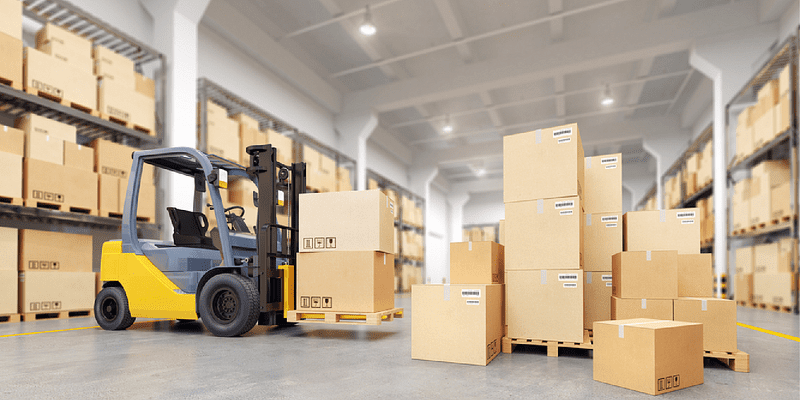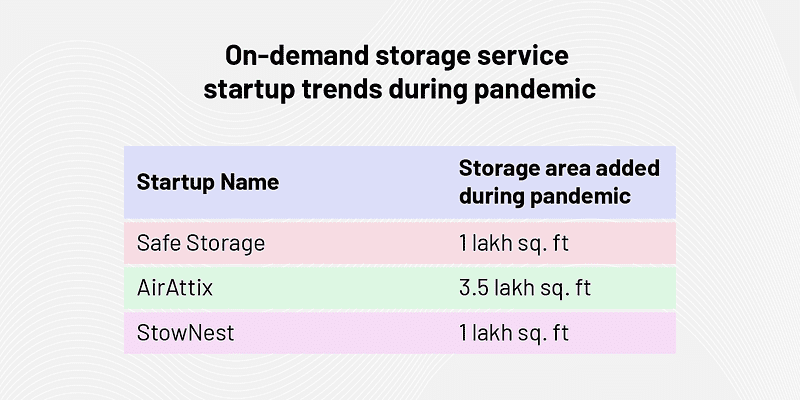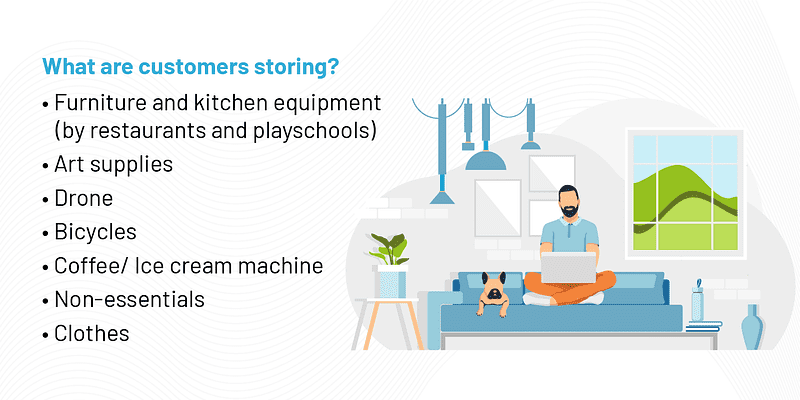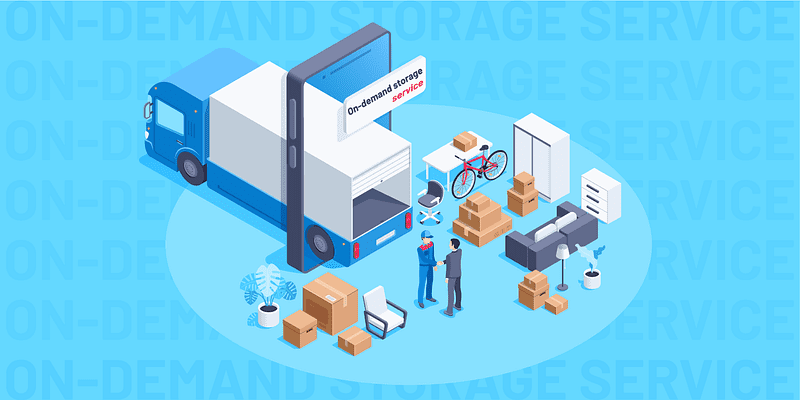As startups and corporates across the country extend work from home policies till early next year due to the COVID-19 crisis, employees residing in cities, away from their homes, have started relocating to their hometowns.
Stuck inside expensive but tiny apartments, a majority of the working population also faced salary cuts and layoffs, which forced them to pack their bags and go back home, pushing up demand for such storage services. The pandemic has also forced many businesses and office spaces to shut down, which made them look for spaces to store their furniture and other equipment, further fuelling the demand for storage services.

Image Source: ShutterStock
Aratrika Barat, an employee with a leading MNC in Bengaluru, stuffed all her essentials in a suitcase and dumped the rest at a PG (paying guest), which has now been converted into a storage facility. “I was paying Rs 15,000 a month for my apartment. Now I only need to pay Rs 2,000 a month for safekeeping three suitcases. So that’s a lot of savings,” she says.
But it is not just residential spaces that are being converted into make-believe warehouses and storage spaces. Over the last five years, on-demand storage services startups have propped up in these ‘migrant’ cities, mostly to cater to B2B players and off-site IT professionals.
“People have started using on-demand storage services since the last two years in very small pockets in the major cities. But since the unlock started, we have been adding more than 1,500 customers every month,” says Sudhindra Subbarao, Co-founder of Bengaluru-based StowNest.

Image Source: ShutterStock
Sudden surge
Bengaluru-based Safe Storage, which started as a 700 sq ft warehouse in 2015, now manages 2.5 lakh sq ft space in Bengaluru, and another 40,000 sq ft in Hyderabad.
“We have added one lakh sq ft in the last three months, with more than 1,000 new customers coming in Bengaluru itself,” Co-founder Ramesh Babu Madisetty tells YourStory.
Pune-based AirAttix increased its warehouse space from 1.5 lakh sq ft to five lakh sq ft during the pandemic. The storage aggregator earlier made up to 15 transactions per month, and now it records up to 60 transactions every month, in Pune alone. Similarly, Safe Storage, which earlier received 100 calls a day, is now juggling with more than 2,200 enquiries every day.
Increasing demand
Safe Storage, which provides packaging, loading, and transportation services to customers is facing challenges on the logistics front. “We are opening up 40 slots every day, but our logistics slots are booked until November,” Ramesh says.
The startup is struggling with logistics despite adding new vendors in the last couple of months. It already has 1,200 additional customers in the pipeline.
AirAttix, which works like an AirBnB for storage, connects customers who have free space to those in need for space. “A lot of property owners are giving away their apartments for storage,” says Founder Aditya Kale.
AirAttix is presently operating in Mumbai, Pune, and Bengaluru. It has also partnered with shopping malls, which have been mostly closed since March-end to meet the increasing demand for storage spaces.
StowNest, on the other hand, has been leasing warehouses to cater to the increasing demand. The startup has increased its warehouse space from 25,000 sq ft in March to 1,25,000 sq ft in September.

Image courtesy: YS Design
B2C takes on B2B
Earlier, AirAttix mostly catered to the ‘techie crowd’ or financial institutions and enterprises, who would store documents with the startup. Post the pandemic, on-demand storage service startups are primarily catering to the ‘work from home’ sector. Both AirAttix and Safe Storage are catering to customers who are vacating their rented houses in the metros and moving back to their hometowns.
For individual users, the startup is providing 50, 100, and 200 sq ft space. The average cost for 100 sq ft space goes up to Rs 5,000 per month, inclusive of taxes. AirAttix provides blanket insurance policy as well.
Up to 20 percent of StowNest’s customer base is from the B2B segment, and the rest are individual customers or households.
Safe Storage is into multiple verticals in both the B2C and B2B segments. It helps customers store household goods (appliances, kitchen utensils, furniture, etc), corporates store employee documents, SMBs or vendors on ecommerce players store inventory, automobile storage and finally, tape vaulting.
What are people storing?
“Unfortunately, restaurants, play-schools, and gyms have also been forced to shut down and they are storing their furniture and equipment with us,” Ramesh says.
AirAttix is providing space for restaurants, dhabas, and ice-cream parlours as well. “They need space to store furniture and kitchen equipment until they are sold,” Aditya says. The space requirement for SMBs is not more than 500 sq ft.
StowNest has added a couple of corporate customers as well. “Companies are downsizing their offices and storing their extra furniture -- chairs and desks with us,” Sudhindra says.

Image courtesy: YS Design
On the B2C front, StowNest is storing some rather ‘unique’ items for its customers. “A customer is storing a 3 ft x 3 ft hand-made drone with us,” Sudhindra says. A couple of customers are storing bicycles too.
A German customer is storing a coffee and an ice-cream machine with the startup. “He wanted to open a cafe in Bengaluru, but his plans were put on hold due to the pandemic,” Sudhindra adds. StowNest is also storing furniture for five Bengaluru-based restaurants which had to be shut down, and paints and canvases for an Art School in Jayanagar.
Priyanka Dey, a practising lawyer in Delhi, had to return to her hometown Kolkata in March. “My rent agreement was about to expire so I decided to leave the house permanently. This way I am also getting to minimise my costs spent on rent,” she says.
Priyanka is using the services of Mr Storage and is paying Rs 6,000 a month to store five suitcases with the startup.
Investor shy sector
According to Research and Markets, the global self-storage market was valued at $87.65 billion in 2019 and is expected to reach $115.62 billion by 2025, registering a CAGR of 134.79 percent between 2020 and 2025.
While the concept of on-demand storage services is popular in the West, the sector is still picking up in India.
However, Mumbai-based BoxMySpace raised Rs 1.92 crore in 2015 from a consortium of investors led by Farooq Oomerbhoy, former co-founder of Orios Venture Partners. Farooq is now the Managing Partner at FAO Ventures and continues to remain associated with the startup. He says, “At the time when I invested, there was no competition...As urban populations grow and residential areas shrink, we realised there would be a massive need for professional storage services.”
However, most of the on-demand storage service startups that YourStory interacted with continue to remain bootstrapped.
Farooq believes that unlike in the western countries, storage is not a massive headache for India’s B2C clients. However, startup founders continue to remain hopeful about the sector.
“The concept of on-demand storage services was alien in India until the recent past. No matter how much we tried, all our promotions failed and we would only acquire around 100 customers by marketing,” Ramesh says. With COVID-19 providing favourable tailwinds for storage startups to grow and flourish, Ramesh says, “My target audience has grown comparatively and Safe Storage will be more reachable now.”
Sudhindra has a similar opinion. “The re was not enough visibility. VC investments in the real estate segment takes more time than others,” he says. StowNest plans to approach VCs soon.
Bootstrapped startup AirAttix also plans to raise its first round of external funding post the pandemic. “VC offices are shut right now and conversations have slowed down, but we have started approaching investors,” Aditya says.
Bubble or permanent?
With uncertainty lingering around what the future of work is going to look like, the question remains whether the demand for such storage service startups is temporary or is it here to stay.
“I will not be using on-demand storage services once things go back to normal, unless a similar situation of moving to a different city arises,” Priyanka says.
Tech platform Betterplace in a recent report suggests that the overall demand for jobs in 2020 would be 14 lakh, which is 70 percent of the 2019 levels. Interestingly, the gig economy will lead 80 percent of this overall demand. This comes as a ray of hope to B2C storage service startups.
SafeStorage, which continues to keep expanding to maintain its COVID-19 revenue numbers, is thinking ahead of its time. “Our warehouses are in the prime locations of cities and we have plans when the demand slows down,” Ramesh adds.

Image Source: ShutterStock
StowNest is also planning to enter Pune and Delhi-NCR markets. It plans to diversify its offerings and wants to be the ‘neighbourhood attic’ to its customers. It is betting on customers who plan to store their extra furniture or household items and get them back as and when required.
The startup launched its services in Hyderabad in August this year, and more recently in Chennai. “It was already in the pipeline, but our plans got delayed due to the pandemic,” Sudhindra says.
AirAttix founder Aditya has already started planning for post-pandemic. The startup has tied up with a couple of builders and interior designers, and is betting on remodelling of buildings and societies. “We have started identifying customers beyond the work from home and restaurant closure segment. We are targeting the on-site crowd,” Aditya says.
AirAttix has also tied up with banks and is betting on documentation storage. The startup has almost doubled its pre-COVID-19 revenue and its monthly revenue from Pune alone stands at Rs 5 lakh.
The change in perception and adoption of B2C on-demand storage service startups will be attributed more to people fearing long term commitments.
Farooq, however, believes that B2B on-demand storage shall continue to rise, and that while these startups will continue to extend their services to B2C players, the focus will be more on B2B storage. “If one wants to build a long-term business with cash flow, large repeat customer rate and long-term value, they have to focus on the SME and corporate sector,” he says.
Edited by Megha Reddy
India’s most prolific entrepreneurship conference TechSparks is back! With it comes an opportunity for early-stage startups to scale and succeed. Apply for Tech30 and get a chance to get funding of up to Rs 50 lakh and pitch to top investors live online.
Link : https://yourstory.com/2020/10/pandemic-demand-storage-service-startups
Author :- Debolina Biswas ( )
October 07, 2020 at 05:10AM
YourStory



